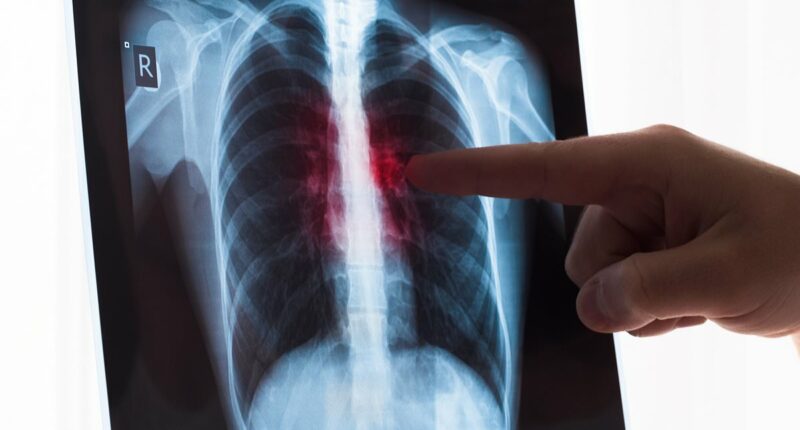Share this @internewscast.com
A plastic surgeon has issued a warning that individuals using weight loss injections may unknowingly endanger their lives during surgical procedures—posing a risk of choking to death.
In the UK, it’s estimated that over 1.5 million people are using weight loss injections, and this number is expected to grow as the government has authorized GPs to prescribe them.
As these injections become a regular part of many people’s routines, a leading medical professional cautions against a potentially fatal oversight—not informing your doctor about using these injections before undergoing general anesthesia.
Dr. Mo Akhavani, a consultant in plastic and cosmetic surgery based in London, shared with the Daily Mail that about 80 percent of his patients are using some type of injection.
He noted that in his practice, approximately one in ten might forget to mention their use of the appetite-suppressing medication.
Typically, patients are told to not eat at least six hours before a surgery to prevent a potentially deadly complication.
This oversight could lead to aspiration pneumonia, a lung infection caused when food, liquid, or saliva is inhaled into the lungs, which can occur if there is food in your stomach.
Dr Akhavani warned the weight loss jab ’causes problems as it delays gastric emptying’—the process of the stomach emptying contents into the small intestine.


The surgeon Dr Mo Akhavani has warned people to tell their surgeons if they are on the jabs
He explained it is ‘very well recognised in the medical world’ that you should come off the jab two weeks or a little longer before a surgery.
Previously researchers in California found weight loss jabs can increase the risk of the complication, which is essentially ‘choking to death’, by 33 per cent.
The study looked at nearly one million Americans who had an endoscopy, which examines the upper digestive tract.
On their findings, the study author Dr Ali Rezaie, said: ‘Aspiration during or after endoscopy can be devastating. If significant, it can lead to respiratory failure, ICU admission and even death.
‘Even mild cases may require close monitoring, respiratory support and medications including antibiotics. It is important we take all possible precautions to prevent aspiration from occurring.’
Dr Akhavani warned: ‘If you are on these [weight loss jabs] please, please, please don’t forget to let your doctors know.’
In his experience, it isn’t that patients are trying to hide it, but rather that they ‘genuinely forget’ because the jab is now a ‘routine part of their life’.
On weight loss jabs, he said: ‘It has now become an acceptable way of managing weight.
But he added: ‘I have personal friends, very attractive young women, nothing wrong with them, and they are on Ozempic and they look emaciated.’
However, he said: ‘Others put on a lot of weight, start exercise and start to accelerate the weight loss. Those ones are probably doing it for the right reasons.’
Under official guidelines, only patients who have a body mass index (BMI) of over 35 and at least one weight-related health problem like high blood pressure, or those who have a BMI of 30 to 34.9 and meet the criteria for referral to a specialist weight management service, should be prescribed weight loss jabs.
The weight-loss jabs have been found to help people lose up to 20 per cent of their body weight in just a few months.
However, there have been numerous reports of side effects after getting the jabs from hair loss and constipation to extreme cases of bloating.
Recently, US experts found that semaglutide—the powerful ingredient behind Wegovy and Ozempic—may ‘waste away muscles’, making it harder to lose weight.
And earlier this summer, in June, slimming jabs like Mounjaro and Wegovy were linked to more than 100 deaths in Britain.
A total of 111 deaths were logged with the regulator, the Medicines and Healthcare products Regulatory Agency (MHRA), up to and including May 29.
But none of the fatalities, which have all been reported since the jabs were licensed for use in the UK, were proven to be caused directly by the drugs.
However, the UK medicines regulator launched a probe into the safety of fat jabs after hundreds of Britons developed pancreatitis, specifically, leaving ten dead.
Nevertheless, the weight loss jabs have remained popular, with pharmacists warning just last month that booming demand may become ‘unsustainable’.
The warning was issued by The National Pharmacy Association (NPA)—which represents over 6,000 community pharmacies.
It came after their recent poll of over 2,000 people showed an increasing demand for private and NHS-backed weight loss services.
The NDA poll revealed a fifth of participants had attempted to access weight loss treatments in the last year.
This figure rose to 35 per cent for those aged between 16 and 34, compared to only seven per cent of those over 55.
Earlier this week a new study revealed a daily weight loss pill that works in a similar way can help users lose an average of almost two stone (12.4kg).
People taking the new wonder drug orforglipron lost an average of 12.4 per cent of their body weight after 72 weeks in a groundbreaking final stage trial.
The participants, who were overweight but did not have diabetes, also benefited from reductions in bad cholesterol, blood fats and blood pressure.
Manufacturer Lilly said the once-a-day pill—the first of its kind—could be launched ‘at scale’ worldwide and ‘without supply constraints’ as early as next year.
















